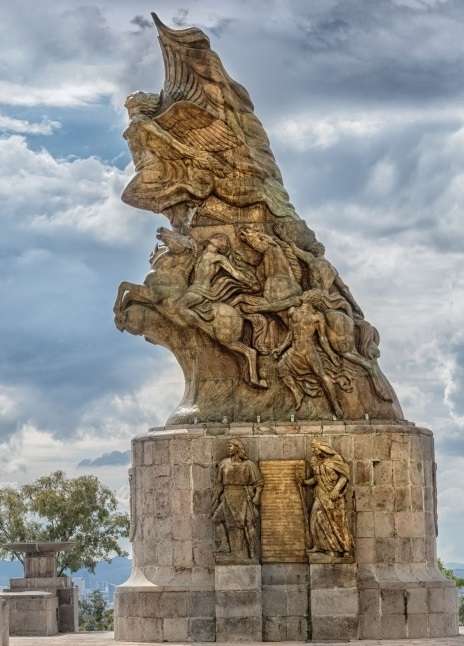Cinco de Mayo

A U.S. celebration of Mexican Heritage
 |
Related Links |
Cinco de Mayo (Spanish for the Fifth of May) began with a proclamation from President Benito Juarez of Mexico, but ever since it's been a mostly American holiday. How did a Mexican battle turn into an American celebration? To answer that, we need to start at the beginning.
The History
In the 1860s, the Second Empire of France under Napoleon III waged war against Mexico, with the intention of deposing the liberal government of President Benito Jurez. Napoleon wanted to create a new empire in Mexico that would ensure French access to the wealth of Latin America. The timing of the American Civil War also meant that the United States would be unable to enforce its Monroe Doctrine in support of the Mexican army.
The Battle of Puebla, fought on May 5, 1862, was a more symbolic victory than a strategic one. A small battalion of Mexican troops under General Ignacio Zaragoza defeated a much larger and better-equipped French army at the city of Puebla. The victory delayed French forces' advancement in the country, and provided a major morale boost for pro-Republic forces. The French troops were successful in conquering the capital of Mexico City and establishing a monarchy, but the Republicans rallied and regained control of Mexico by 1867.
President Juarez declared that May 5 be a holiday to commemorate the valiant efforts of Puebla's defenders. Its acknowledgement in Mexico is minor and fairly regional, with the most recognition around Puebla. This should not be mistaken with Mexican Independence Day. Mexico's independence day celebrates independence from Spain on September 16 and is one of the biggest Mexican holidays.
What does the U.S. have to do with it?
The U.S. recognition and celebration of the Battle of Puebla is almost as old as its recognition in Mexico, believe it or not. According to a historical study by UCLA, Californios of Mexican descent heard about the incredible Mexican victory and began celebrating as early as 1863. After that it remained a regular-if localized-observance in Mexican-American communities for decades.
With the rise of the Chicano movement in the 1960s (a cultural movement for Mexican-American civil rights and empowerment), Cinco de Mayo was brought from California (especially Los Angeles) and spread through the country. While it began as more overtly political, over time Cinco de Mayo morphed into a general celebration of Mexican heritage. It became fairly widespread and by the 1980s businesses were looking to get involved in the festivities.
In 2005 an act of Congress recognized Cinco de Mayo as a national holiday:
Whereas Cinco de Mayo also serves as a reminder of the close spiritual and economic ties between the people of Mexico and the people of the United States, and is especially important for the people of the southwestern States where millions of Mexicans and Mexican-Americans make their homes;
Whereas in a larger sense Cinco de Mayo symbolizes the right of a free people to self-determination, just as Benito Juarez once said, "El respeto al derecho ajeno es la paz'' (The respect of other people's rights is peace); and
Whereas many people celebrate during the entire week in which Cinco de Mayo falls: Now, therefore, be it
Resolved by the House of Representatives (the Senate concurring), That Congress recognizes the historical struggle for independence and freedom of the Mexican people and requests the President to issue a proclamation recognizing that struggle and calling upon the people of the United States to observe Cinco de Mayo with appropriate ceremonies and activities.
How America Invented St. Patrick's Day
Before Cinco de Mayo, it was St. Patrick's Day. The feast of St. Patrick is celebrated annually in Ireland with church visits and reflections on Irish identity. However, it was a fairly minor and limited affair in its home country. It was mostly in the Irish-American enclaves of Boston and New York that immigrant families decided to commemorate their nation's saint as a show of pride. This took on a more boisterous tone in the face of frequently violent discrimination, and as Irish-Americans became more influential in industrial America.
St. Patrick's day is now an excuse to drink copious amounts of beer (sometimes green) and for companies to push shirts that say "Kiss Me I'm Irish." That is to say it hardly reflects the culture of Ireland. But, it can mean a great deal to the descendants of Irish immigrants.
This phenomenon isn't entirely unique. Minority and immigrant communities can face special challenges which cause them to stick together. Making a big deal out of even minor holidays and activities is a way to preserve and celebrate the cultural identity that distinguishes them from the majority population. At their best, these practices become valuable parts of the cultural landscape and enrich the lives of their participants. So while St. Patrick's Day isn't authentically Irish, and Cinco de Mayo celebrations aren't authentically Mexican, that doesn't mean they're not legitimate holidays for the American communities they represent.
Sombreros and Margaritas
As the holiday became more popular, companies began pushing sales of Mexican beers, sombreros, and other Mexican-identified products. This commercial fiesta atmosphere led to the holiday being widely celebrated among the general American public, even those with no ties to the Mexican community. Many feel that this commercialization cheapens the holiday; at worst, it can be seen as belittling Mexican(-American) culture by reducing it to simple items and stereotypes.
That doesn't inherently make it a problem to celebrate Cinco de Mayo. You can eat Mexican food and go to a Mexican folk dance festival, and you can listen to Mexican music even if you don't speak Spanish. The important thing is that you take the time to reflect on the many meaningful accomplishments of the Mexican people, and to show respect for the Mexican-American people in your community.







